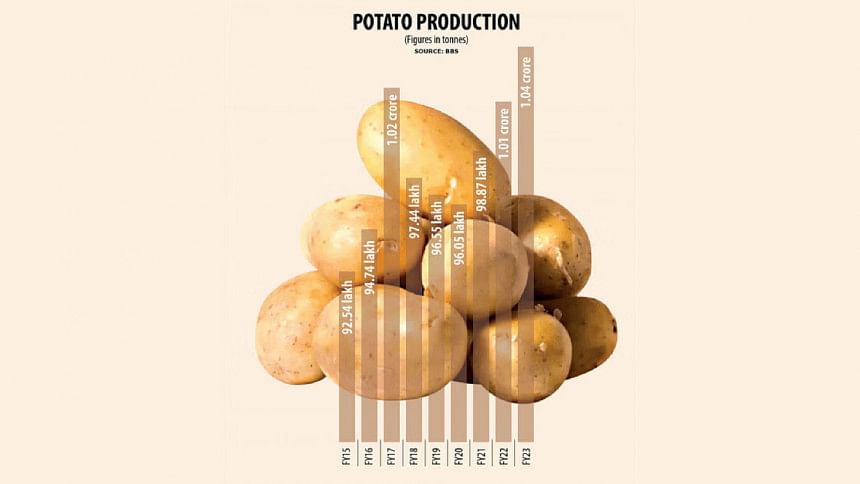Record potato production, yet prices going up

Potato prices are soaring even though farmers this year grew a record 1.04 crore tonnes, cutting the buying power of consumers, especially fixed and low-income people already battered by sustained high inflation.
Within one week, prices increased by Tk 5 per kilogramme (kg) to a maximum of Tk 45 in Dhaka's markets, as per the Trading Corporation of Bangladesh, which is being blamed on supplies falling short of demand.
The current price is 57 percent higher than that a year ago.
Prices are going up as traders and farmers of large-scale operations, who store potatoes in cold storages for sale during the lean season, are taking it slow in releasing their stocks, according to stakeholders.
With planting starting in September, potatoes take 90 days to grow. Harvests from January ensures supplies for the next couple of months. However, by June, stocks in cold storages need to be released and this continues till the next harvest.
Stocks of the popular tuber become depleted at this stage of the year as demand rises for high prices of other vegetables.
The annual production figure came from the Bangladesh Bureau of Statistics, which says it was 2.83 percent higher than that in the preceding year.
Annual demand stands at around 1 crore tonnes, according to market players.
"This year's production is a record high in Bangladesh's history. Currently, there is no scarcity of potato in the country," said Md Tajul Islam Patwary, director of field services at the Department of Agricultural Extension.
On the reason behind the price rise, he blamed a lack of market monitoring by agencies responsible, such as the Directorate of National Consumers' Right Protection (DNCRP).
However, Bangladesh Cold Storage Association (BCSA) disagreed with the government's production estimate, saying it would not exceed 80 lakh tonnes.
"We do not agree with the government data," said Mostafa Azad Chowdhury, president of the BCSA, whose members own 181 out of the over 400 cold storages in the country.
Some 20 percent of the cold storage capacity of the BSCA members have remained unutilised, he said. "If the potato production is high, where are these surplus potatoes?" he questioned.
He said traders were releasing stocks slowly as they know that farmers have exhausted their stocks.
Some vegetable vendors in the Agargaon kitchen market were found charging up to Tk 50 for every kg of potatoes yesterday.
One of them, Jewel Mollah, said he bought each kilogramme at Tk 42 from Karwan Bazar and was selling it for Tk 45.
Nasir Uddin, a wholesaler in Karwan Bazar, one of Dhaka's biggest kitchen markets, said each 65-kg bag was selling for Tk 2,470 where it was Tk 2,145 one or two weeks back.
The price hike has also hit north of the country, where a lion's share has been produced.
Traders, particularly those in Rail-Bazarhat and Bahadurbazar of the northwestern district of Dinajpur, said wholesale and retail prices had been stable until Eid-ul-Azha last month.
Just prior to Eid, each kilogramme was available at Tk 22 to Tk 25 in the district town. Shortly afterwards, the price shot up to Tk 35.
Since then, it has continued to rise at both retail and wholesale, with a recent increase of Tk 5 per kilogramme.
Md Sumon Ali, a wholesaler in Railbazarhat, Dinajpur, said the frequent price fluctuations were primarily driven by shifts in supplies. He was charging up to Tk 45 per kilogramme on Monday.
Shafiqul Islam, another wholesaler in Dinajpur, linked the surge to market manipulation by big traders.
He said high prices of other vegetables have compelled consumers to switch to potatoes, thereby increasing potato consumption in the country.
Ghulam Rahman, president of the Consumers Association of Bangladesh (CAB), blamed a lack of market monitoring and a mentality of businesses to avail excess profits.
"When potato production remains at a surplus, the hike of price is not acceptable," he said.
AHM Shafiquzzaman, director general of the DNCRP, said they lacked manpower to comprehensively monitor the market.
"It's difficult to monitor all products in the kitchen market. When any product's price becomes abnormal, we immediately take action," he said.
"We don't have the market price or details of production cost. The Department of Agricultural Marketing should have taken steps in this regard," he said.
Seeking anonymity, a DNCRP official said market stocks did not reflect the agricultural data.

 For all latest news, follow The Daily Star's Google News channel.
For all latest news, follow The Daily Star's Google News channel. 



Comments